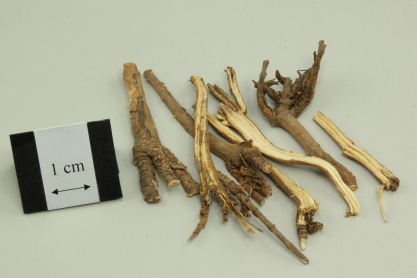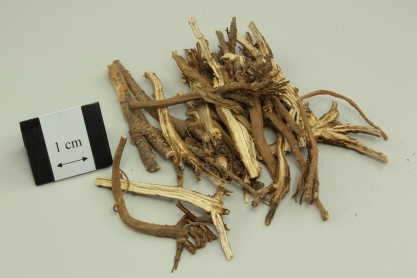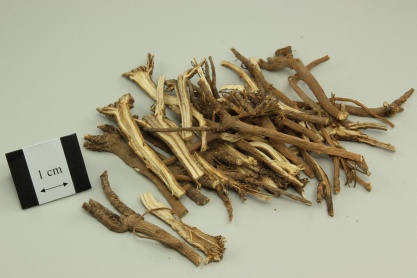柴胡
- ENG
- Chinese Thorowax Root
- LATIN
- Bupleuri Radix
| Medicinal Group | Wind-heat dispersing medicinal |
|---|---|
| Source | Dried root of Bupleurum chinense DC. or Bupleurum scorzonerifolium Willd. (Fam. Umbelliferae) |
| Nature and Flavors | bitter; slightly cold |
| Meridian Affinity | Liver, Gallbladder |
| Actions | To harmonizing exterior and interior, soothe the liver, and upraise yang. |
Family
Umbelliferae
Part used
Root and Rhizome
Indications
Common cold with fever; alternate chills and fever such as malaria; distending pain in the chest and hypochondriac regions; menstrual disorders; prolapse of the uterus, prolapse of the rectum
- Integrative medicine (consisted of thorowax root) could adjust immune function to display a quick, potent anti-inflammatory and anti-anaphylactic actions in treating chronic urticaria with less adverse reaction and low recurrent rate.[1]
- Radix Bupleuri extracts exhibit evident anti-inflammatory, antitumor, antiviral, anti-allergic, immunoregulation, and neuroregulation activities. [2]
- The alliance of acupuncture and medication (included Radix Bupleuri) achieves the definite efficacy on depression, characterized as less adverse reactions and better safety. [3]
- Resolving phlegm method ( composed of vinegar prepared Radix Bupleuri) could effectively improve liver function and fibrinolytic status. [4]
Cautions
Its nature is to raise and disperse. Contraindicated in a patient who has deficiency of kidney-yin and abnormal rise of liver-yang
Report on adverse effect
Research Findings
- The main side effect of Radix Bupleuri is liver damage when the dosage is excess. [2]
- Incorrect use is the main cause of adverse drug reactions or adverse events (ADRs/AEs) of Chaihu Injection (CI) [5]
- Pro-oxidative effects on G6PD-deficient erythrocytes in vitro [6]
- Mild lassitude, sedation, and drowsiness have been reported as frequent side effects. Large doses have also been reported to decrease appetite and cause pronounced flatulence and abdominal distension. Three incidents of allergic reactions were reported in patients given intramuscular injections of the drug [7].
Reference
Reference
- Jin CY, Wang DL, Fang ZD. (2008 ). Effect of integrative Chinese and Western medicine in treating chronic urticaria and its impact on interleukin-10 and interleukin-8 in peripheral blood. Zhongguo Zhong Xi Yi Jie He Za Zhi. , 28(4):358-60.
- Yuan B, Yang R, Ma Y, Zhou S, Zhang X, Liu Y. (2017). A systematic review of the active saikosaponins and extracts isolated from Radix Bupleuri and their applications. Pharm Biol. , 55(1):620-635.
- Liu EJ, Zhang WL, Bai YP. (2013). Observation on clinical efficacy of depression treated with the alliance of acupuncture and medication. Zhongguo Zhen Jiu. , 33(6):497-500.
- Chen L, Jiang YK, Cai YB. (2006). Effects of resolving phlegm method on fibrinolytic status in non-alcoholic steatohepatitis patients of phlegm and blood-stasis syndrome. Zhongguo Zhong Xi Yi Jie He Za Zhi. , 26(12):1090-3.
- Huang YG, Kang JK, Liu RS, Oh KW, Nam CJ, Kim HS (1997) Cytotoxic activities of various fractions extracted from some pharmaceutical insect relatives. Arch.Pharm.Res., 20, 2, 110-114.
- Ko CH, Li K, Ng PC, Fung KP, Wong R, Chui KM, Gu G, Yung E, Fok TF (2008) Pro- oxidative effects of Chinese herbal medicine on G6PD- deficient erythrocytes in vitro. TOXICOLOGY IN VITRO, 22, 5, 1222-1227.
- Chang HM, But PPH, eds. Pharmacology and applications of Chinese materia medica, Vol. 2. Singapore, World Scientific Publishing, 1987.












